新概念英语第一册 第21-22课
新概念英语第一册单词表(1-143课)

英文
excuse me yes is this your handbag pardon it thank you very much
音标
[ik'skju:z] [mi:, mi] [jes] [iz, s, z, əz] [ðis] [jə:, jɔ:, jər, jɔ:r] ['hændbæg] ['pɑ:dən] [it]
pron. I
v.
am
v.
aren.ຫໍສະໝຸດ namea.&pron. what
n.
nationality
n.
job
n.
keyboard
['mistə] [gud] ['mɔ:niŋ] [mis] [nju:] ['stju:dənt] [frentʃ] ['dʒə:mən] ['nais] [mi:t] [ˌdʒæpə'ni:z] [kə'riən] [ˌtʃai'ni:z] [tu:]
v.
see
[hə'ləu] [hai] [hau] [tə'dei] [wel] [fain] [θæŋks] [ˌgud'bai] [si:]
a.
fat
n.
woman
a.
thin
a.
tall
a.
short
a.
dirty
a.
clean
a.
hot
a.
cold
a.
old
a.
young
a.
busy
a.
lazy
[fæt] ['wumən] [θin] [tɔ:l] [ʃɔ:t] ['də:ti] [kli:n] [hɔt] [kəuld] [əuld] [jʌŋ] ['bizi] ['leizi]
新概念英语第一册课文(全中文)
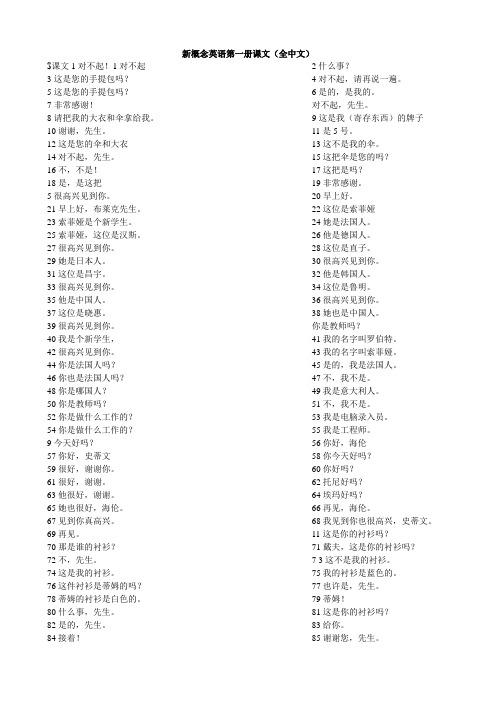
新概念英语第一册课文(全中文)$课文1对不起!1对不起2什么事?3这是您的手提包吗?4对不起,请再说一遍。
5这是您的手提包吗?6是的,是我的。
7非常感谢!对不起,先生。
8请把我的大衣和伞拿给我。
9这是我(寄存东西)的牌子10谢谢,先生。
11是5号。
12这是您的伞和大衣13这不是我的伞。
14对不起,先生。
15这把伞是您的吗?16不,不是!17这把是吗?18是,是这把19非常感谢。
5很高兴见到你。
20早上好。
21早上好,布莱克先生。
22这位是索菲娅23索菲娅是个新学生。
24她是法国人。
25索菲娅,这位是汉斯。
26他是德国人。
27很高兴见到你。
28这位是直子。
29她是日本人。
30很高兴见到你。
31这位是昌宇。
32他是韩国人。
33很高兴见到你。
34这位是鲁明。
35他是中国人。
36很高兴见到你。
37这位是晓惠。
38她也是中国人。
39很高兴见到你。
你是教师吗?40我是个新学生,41我的名字叫罗伯特。
42很高兴见到你。
43我的名字叫索菲娅。
44你是法国人吗?45是的,我是法国人。
46你也是法国人吗?47不,我不是。
48你是哪国人?49我是意大利人。
50你是教师吗?51不,我不是。
52你是做什么工作的?53我是电脑录入员。
54你是做什么工作的?55我是工程师。
9今天好吗?56你好,海伦57你好,史蒂文58你今天好吗?59很好,谢谢你。
60你好吗?61很好,谢谢。
62托尼好吗?63他很好,谢谢。
64埃玛好吗?65她也很好,海伦。
66再见,海伦。
67见到你真高兴。
68我见到你也很高兴,史蒂文。
69再见。
11这是你的衬衫吗?70那是谁的衬衫?71戴夫,这是你的衬衫吗?72不,先生。
7 3这不是我的衬衫。
74这是我的衬衫。
75我的衬衫是蓝色的。
76这件衬衫是蒂姆的吗?77也许是,先生。
78蒂姆的衬衫是白色的。
79蒂姆!80什么事,先生。
81这是你的衬衫吗?82是的,先生。
83给你。
84接着!85谢谢您,先生。
$课文13一件新连衣裙86你的新连衣裙是什么颜色的?87是绿色的。
新概念英语第一册听课笔记第21课

新概念英语第一册听课笔记第21 课Lesson 21 Which book?give v. 给one pron. 一个which question word 哪一个empty adj.空的full adj. 满的large adj. 大的little adj. 小的sharp adj. 尖的,锋利的small adj. 小的big adj. 大的blunt adj. 钝的box n.盒子glass n. 杯子cup n. 茶杯bottle n. 瓶子tin n. 罐头knife n.刀子fork n. 叉子spoon n. 勺子give 给,它的主语能够是人,也能够是物:Teaching gives me a lot of pleasure.give sb. sth.give sth. to sb.Give me a pen please. 请给我一支钢笔。
Give a pen to me please.offer 提供,只能是人做主语provide 免费提供supply 供应donate 捐献con tribute 贡献:I have con tributed all my life toteaching career.★ TextGive me a book please, Jane.Which book?This one?No, not that one. The red one.This one?Yes, please.Here you are.Thank you.Lesson 21 Which book? 哪一本书?give v. 给one pron. 一个which question word 哪一个Less on 22 Give me / him/her / us/them a … Which one?给我/他/ 她/他们一…哪一个?empty adj. 空的box(boxes)n. 盒子,箱子full adj. 满的glass (glasses )n. 杯子large adj. 大的cup(cups)n. 茶杯小的bottle (bottles )n. 瓶子little adj.sharp adj. 尖的,锋利的tin (tins )n. 罐头small adj. 小的knife (kinves )n. 刀子big adj. 大的fork (forks )n. 叉子blunt adj. 钝的spoon (spoons)n. 勺子Lesson 23 Which glasses? 哪几只杯子?on prep. 在之上shelf n. 架子,搁板Less on 24 Give me / him/her / us/them some … Which ones?给我/他/ 她/他们一些…哪些?desk n. 课桌table n. 桌子plate n. 盘子cupboard n. 食橱cigarette n. 香烟television n. 电视机floor n. 地板dressing table 梳妆台magazine n. 杂志bed n. 床newspaper n. 报纸stereo n. 立体声音响。
新概念英语第一册课文翻译及学习笔记Lesson21_26
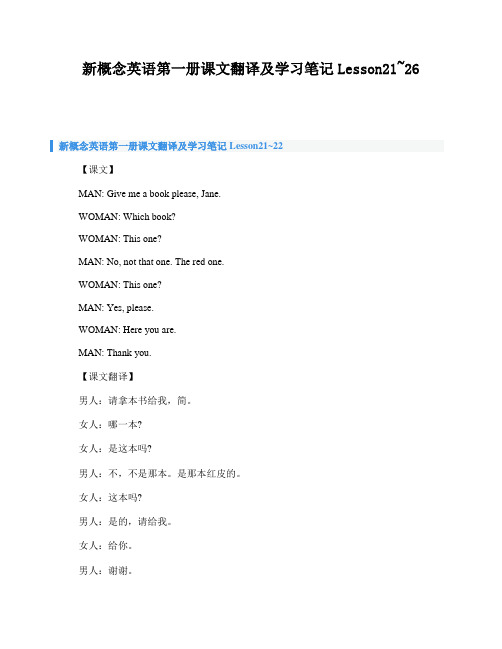
新概念英语第一册课文翻译及学习笔记Lesson21~26新概念英语第一册课文翻译及学习笔记Lesson21~22【课文】MAN: Give me a book please, Jane.WOMAN: Which book?WOMAN: This one?MAN: No, not that one. The red one.WOMAN: This one?MAN: Yes, please.WOMAN: Here you are.MAN: Thank you.【课文翻译】男人:请拿本书给我,简。
女人:哪一本?女人:是这本吗?男人:不,不是那本。
是那本红皮的。
女人:这本吗?男人:是的,请给我。
女人:给你。
男人:谢谢。
【生词】give v. 给one pron.一个which question word 哪一个【知识点讲解】1. 今天我们来学习一种新的句型:祈使句,Imperative Sentence 。
用于表达命令、请求、劝告、警告、禁止等的句子叫做祈使句。
祈使句的主语一般都省略,直接用动词原形开头。
比如课文中的:Give me a book please. 这里如果用完整的表达是You give a book please. 但除非是要强调You,一般很少这么表达。
再举几个例子:Be quiet, please. 或 Please be quiet. ——请安静。
在祈使句中please放在句首句尾都是可以的。
这里可以看到用到的是be动词原形。
Sit down, please. ——请坐下。
Look out! 或 Watch out! ——小心!2. which这个疑问词我们之前提到过,表示对确切物体的询问。
which和what的区别是:前者用于选择范围较小或较明确的场合,后者用于选择范围较大或不明确的场合。
比如:Which color is your car, black or white? 你的车是什么颜色?黑色或白色?(确切地在黑与白中间提问)What color is your car? 你的车是什么颜色的?(不确定是什么颜色,没有限制)另外课文当中的which one是which book的省略。
(完整word)新概念第一册-《1-144课单词背默练习》

荷兰
英国
德国
法国
意大利
挪威
俄罗斯
西班牙
瑞典
丹麦
L 53—54
汉语
英语
音标
汉语
英语
音标
温和的、温暖的
总是
北方
东方
南方
西方
潮湿的
季节
最
夜晚
升起
早
(太阳)落下去
晚、迟
有趣的
话题
谈话
澳大利亚
奥地利
澳大利亚人、澳大利亚的
奥地利人、奥地利的
加拿大
中国
加拿大人、加拿大的
芬兰
印度
芬兰人
印度人、印度的
日本
尼日利亚
英语
音标
颜色
绿色
来
楼上
时髦的
帽子
相同的
可爱的
箱子
地毯
狗
L 15—16
汉语
英语
音标
汉语
英语
音标
海关
官员
女孩、姑娘
丹麦人、丹麦的
朋友
挪威人、挪威的
护照
棕色的
旅游者
俄罗斯人、俄罗斯的
这些
荷兰人、荷兰的
红色的
灰色的
黄色的
黑色的
橘黄色的
蓝色的
L 17—18
汉语
英语
音标
汉语
英语
音标
雇员
勤奋的
推销员
男人
办公室
助手
英语
音标
汉语
英语
音标
当然
水壶
在。..后面
茶壶
现在、此刻
找到
能够
沸腾、开
L 45—46
新概念英语第一册第21-22课(课堂PPT)
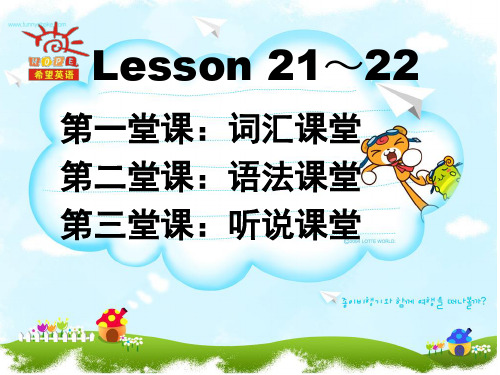
These ice creams are nice! 8 你们现在好了吗?
Are you all right now?
5
音标复习
6
7
语音强化训练 十二
复习辅音
连滑 浊化
希望英语培训中心
8
语 音 规 律 —辅音连滑,浊化
拼读:
40
精讲课文
41
本课语言点
1.Give me a book please,Jane. 此句为祈使句。主语you省略,
后加please,表示客气的请求。 =Give a book to me,please.
give后面接复合宾语, 直接宾语为a book, 间接宾语为me。
42
本课语言点 2.Which book?哪一本书?
(How many people are there in this dialogue?)
5 Ask me who they are. (Who are they?)
51
52
16办公室office17妈妈(儿m语um) 18小sm的all
19祖父grandfa2th0e男r 人 m2a1n好,可以 right
22开着的open23祖母grandmo2th4助er手 assistant
3
本周过关句型
1 怎么啦,孩子们?。 What's the matter,children?
adj.大的 adj.小的
希望英语培训中心
14
New words and expressions
8. big [big]
adj.大的
除了具large的意思,在big修饰人的时候,主要指大人物,但个 子未必高。a big film star 著名的电影明星
新概念英语第一册21-22-23-24课课件
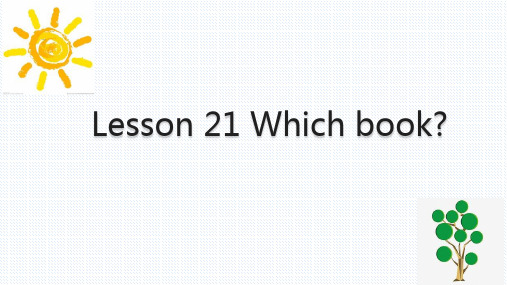
Exercise :
1. __M_y___(My/I) teacher is young. 2. __T_h_e_y_(They/ Their) are policemen. 3.Are these Tom's books?
_H_i_s__(His/Her) books are there.
4.He is _o_u_r___(our/ we) teacher.
old
Give me a _t_i_n__, please. Which one? This/That _n_e_w___one? No, not this/ that __n_e_w__one, this/that _o_l_d___one.
Listen and say
sharp
blunt
Give me a _k_n_if_e_, please.
small /smɔ:l/ a.小的 big /big/a.大的 blunt /blʌnt/ a.钝的
knife /naif/ n.刀子 fork /fɔ:k/ n.叉子 spoon/spu:n/n.勺子
speak English quickly and loudly
read and speak Chinese quickly and loudly
empty /'empti/ a.空的
box /bɔks/ n.盒子,箱子
full /ful/ a.满的
glass /glɑ:s/ n.杯子
large /lɑ:dʒ/ a.大的
cup /kʌp/ n.茶杯
little /'litl/ a.小的
bottle /'bɔtl/ n.瓶子
sharp /ʃɑ:p/ a.尖的,锋利的 tin /tin/ n.罐头
Lesson21-22练习题(试题)-2021-2022学年英语新概念第一册
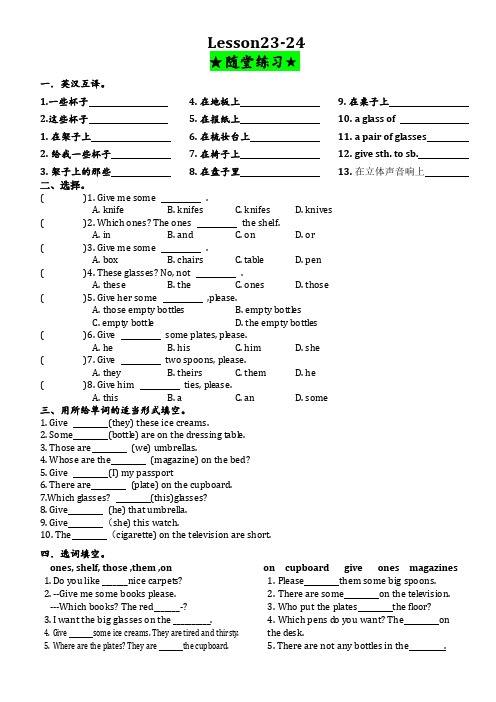
Lesson23-24★随堂练习★一.英汉互译。
1.一些杯子2.这些杯子1.在架子上2.给我一些杯子3.架子上的那些4.在地板上5.在报纸上6.在梳妆台上7.在椅子上8.在盘子里9.在桌子上10.a glass of11.a pair of glasses12.give sth. to sb.13.在立体声音响上二、选择。
( )1. Give me some .A. knifeB. knifesC. knifesD. knives ( )2. Which ones? The ones the shelf.A. inB. andC. onD. or ( )3. Give me some .A. boxB. chairsC. tabl eD. pen ( )4. These glasses? No, not .A. theseB. theC. onesD. those ( )5. Give her some ,pl ease.A. those empty bottlesB. empty bottlesC. empty bottleD. the empty bottles ( )6. Give some plates, pl ease.A. heB. hisC. himD. she ( )7. Give two spoons, pl ease.A. theyB. theirsC. themD. he ( )8. Give him ties, pl ease.A. thisB. aC. anD. some三、用所给单词的适当形式填空。
1. Give (they) these ice creams.2. Some (bottle) are on the dressing tabl e.3. Those are (we) umbrellas.4. Whose are the (magazine) on the bed?5. Give (I) my passport6. There are (plate) on the cupboard.7.Which glasses? (this)glasses?8. Give (he) that umbrella.9. Give (she) this watch.10. The (cigarette) on the television are short.四.选词填空。
!新概念英语第一册lesson21-22 (课堂PPT)

Lesson 22
Give me/him/her/us/them a…
Which one?
35
36
37
38
39
v. 清空
adj. 完全的;完整的 be full of 装满;充满
40
little small
large
6
人称代词训练
我是他的姐姐。 她是汤姆的妈妈。 我喜欢她。 我们讨厌他们。 他们是我的朋友。 请给我们一些时间。 你是他们的老师吗?
7
间接宾语
直接宾语
give sb. sth. = give sth to sb. give me that pen = give to me
8
句子成分
11
谓语:
说明主语“是什么”或“怎么样”。 谓语必须用动词。谓语和主语在人 称和数上必须一致。
谓语在主语后面。 I like Tank.
12
找出谓语
1.He studies English at school. 2. I go to work in the morning. 3. She speaks French. 4. Kelly reads books every day. 5. Jojo cleans the house every day. 6.We like Michelle and GiGi. 7.I have a young father. 8. We listen to Michelle in class.
15
间接宾语(人)
直接宾语(物)
give sb. sth. = give sth to sb. give me that pen = give to me
16
新概念英语第一册lesson21-22课件-Final.
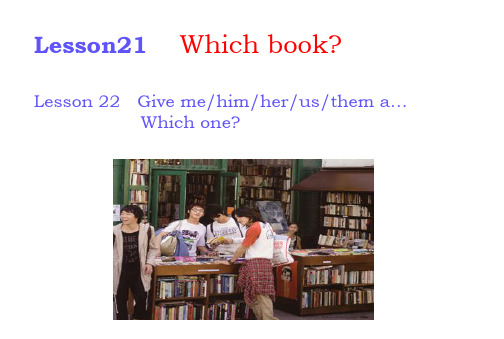
14 90
40
16
50 17 18
15
70
19
80
60
基数词的构成
5) 101—999,三位数,百读作hundred,
百位与十位/个位之间加and。
101 one hundred and one 840 eight hundred and forty 693 six hundred and ninety-three
empty---full
sharp---blunt
clean---dirty
slow ---quick/fast cold--- hot warm --- cool dark --- bright in --- out up --- down left --- right open--- close
这里几乎没人住。
* There are classroom.
a fewstudents in the
教室里有一些学生。
* I kn我o不w 懂英lit语tleE。nglish.
* There is
milk in the bottle.
瓶子里有a些l牛itt奶le 。
❖ There is littlewater in the glass.
特殊拼写: 13– thirteen 15--fifteen 18—eighteen
3)20-90, 以-ty结尾。 20—twenty 30---thirty 40—forty 50—fifty 80---eighty 60---sixty 70---seventy 90—ninety
4)21-99, 两位数,十位与个位之间有 “-”。 21 twenty—one 55 fifty—five 99 ninety—nine
新概念英语第一册课文word版

Lesson1: Excuse me!Excuse me!Yes?Is this your handbag?Pardon?Is this your handbag?Yes, it is.Thank you very much.Lesson 3:Sorry sir.My coat and my umbrella please. Here is my ticket.Thank you sir.Number five.Here is your umbrella and your coat. This is not my umbrella.Sorry sir.Is this your umbrella?No, it isn't.Is this it?Yes, it is.Thank you very much.Lesson 5: Nice to meet you.Good morning.Good morning, Mr. Blake.This is Miss Sophie Dupont.Sophie is a new student.She is a French.Sophie, this is Hans.He is German.Nice to meet you.And this is Naoko.She’s Japanese.Nice to meet you.And this is Chang-woo.He’s Korean. (朝鲜人)Nice to meet you.And this is Luming.He’s Chinese.Nice to meet you.And this is Xiaohui.She’s Chinese, too.Nice to meet you.Lesson 7: Are you a teacher? I’m a new student.My name’s Robert.Nice to meet you.My name’s Sophie.Are you French?Yes, I’m.Are you French, too?No, I’m not.What nationality are you? I’m Italian.Are you a teacher?No, I’m not.What’s your job?I’m a keyboard operator. What’s your job?I’m an engineer.Lesson 9: How are you today? Hello, Helen.Hi, Steven.How are you today?I’m very well, Thank you. And you?I’m fine, thanks.How is Tony?He’s fine, Thanks.How’s Emma?She’s very well, too, Helen. Goodbye, Helen.Nice to see you.Nice to see you, too, Steven. Goodbye.Lesson 11: Is this your shirt? Whose shirt is that?Is this your shirt, Dave?No, sir.It’s not my shirt.This is my shirt.My shirt is blue.Is this shirt Tim’s?Perhaps it is, sir.Tim’s shirt is white.Tim!Yes, sir.Is this your shirt?Yes, Sir.Here you are.Catch.Thank you, sir.Lesson 13: A new dressWhat color is your new dress?It is green.Come upstairs and see it. Thanks you.Look!Here it is!That’s a nice dress.It’s very smart.My hat’s new, too.What color is it?It’s the same color.It’s green, too.That’s a lovely hat.Lesson 15: Your passport, please. Are you Swedish?No, we are not.We are Danish.Are your friends Danish, too? No, they aren’t.They are Norwegian.Your passport, please.Here they are.Are there your cases?No, they aren’t.Our cases are brown.Here they are.Are you tourists?Yes, we are.Are your friends tourists too?Yes, they are.That’s fine.Thank you very much.Lesson 17: How do you doCome and meet our employees, Mr. Richards. Thank you, Mr. Jackson.This is Nicola Grey, and this is Claire Taylor. How do you do?Those women are very hard-working.What are their jobs?They’re keyboard operators.This is Michael Baker, and this is Jeremy Short. How do you do?They aren’t very busy!What are their jobs?They’re sales reps.They are very lazy.Who is this young man?This is Jim.He is our office assistant.Lesson 19: Tired and thirstyWhat’s the mater, children?We are tired and thirsty, Mum.Sit down here.Are you all right now?No, we aren’t.Look!There’s an ice c ream man.Two ice creams please.Here you are, children.Thanks, Mum.These ice creams are nice.Are you all right now?Yes, we are, thank you.Lesson 21: Which book?Give me a book please, Jane.Which book?This one?No, not that one. The red one.This one?Yes, please.Here you are.Thank you.Lesson 23: Which glasses?Give me some glasses please, Jane. Which glasses?These glasses.No, not those. The ones on the shelf. These?Yes, please.Here you are.Thanks.Lesson25: Mr s. Smith’s kitchenMrs. Smith’s kitchen is small.There is a refrigerator in the kitchen.The refrigerator is white.It is on the right.There is an electric cooker in the kitchen. The cooker is blue.It is on the left.There is a table in the middle of the room. There is a bottle on the table.The bottle is empty.There is a cup on the table, too.The cup is clean.Lesson 27: Mrs. Smith’s living roomMrs. Smith’s living room is large.There is a television in the room.The television is near the window.There are some magazines on the television. There is a table in the room.There are some newspapers on the table.There are some armchairs in the room.The armchairs are near the table.There is a stereo in the room.The stereo is near the door.There are some books on the stereo.There are some pictures in the room.The pictures are on the wall.Lesson 29: Come in, Amy.Come in, Amy.Shut the door, please.This bedroom is very untidy.What must I do, Mrs. Jones?Open the window and air the room.Then put these clothes in the wardrobe.〔衣橱〕Then make the bed.Dust the dressing table.Then sweep the floor.Lesson31: Where’s Sally?Where’s Sally, Jack?She’s in the garden, Jane.What’s she doing?She’s sitting under the tree.Is Tim in the garden, too?Yes, he is.He’s climbing the tree.I beg your pardon?Who’s climbing the tree.Tim is.What about the dog?The dog’s in the garden, too.It’s running across the grass.It’s running after a cat.Lesson 33: A fine dayIt’s a fine day today.There are some clouds in the sky, but the sun is shining. Mrs. Jones’s with his family.They are walking over the bridge.There are some boats on the river.Mrs. Jones and his wife are looking at them.Sally is looking at a big ship.The ship is going under the bridge.Tim is looking at an aeroplane.The aeroplane is flying over the river.Lesson 35: Our villageThis is a photograph of our village.Our village is in a valley.It is between two hills.The village is on a river.Here is another photograph of the village.My wife and I are walking alone the banks of the river. We are on the left.There is a boy in the water.He is swimming across the river.Here is another photograph.This is the school building.It is beside a park.The park is on the right.Some children are coming out of the building.Some of them are going into the park.Lesson37: Making a bookcaseYou’re working hard, George.What are you doing?I’m making a bookcase.Give me that hammer please, Dan.Which hammer.This one?No, not that one.The big one.Here you are.Thanks, Dan.What are you going to do now, George?I’m going to paint it.What colour are you going to paint it?I’m going to paint it pink.Pink!This bookcase isn’t for me.It’s for my daughter, Susan.Pink’s her favorite colour.Lesson39: Don’t drop it!What are you going to do with that vase, Penny? I’m going to put it on this table, Sam.Don’t do that.Give it to me.What are you going to do with it?I’m going to put it here, in front of the window. Be careful.Don’t drop it!Don’t put it there, Sam.Put it here, on this shelf.There we are!It’s a lovely vase.Those flowers are lovely, too.Lesson41: Penny’s bagIs that bag heavy, Penny?Not very.Here!Put it on this chair.What’s in it?A piece of cheese.A loaf of bread.A bar of soap.A bar of chocolate.A bottle of milk.A pound of sugar.Half a pound of coffee.A quarter of a pound of tea.And a tin of tobacco.Is that tin of tobacco for me?Well, it’s certainly not for me!Lesson43: Hurry up!Can you make the tea, Sam?Yes, of course I can, Penny.Is there any water in this kettle(水壶)?Yes, there is.Where’s the tea?It’s over there, behind the teapot.Can you see it?I can see the teapot, but I can’t see the tea.There it is!It’s in front of you.Ah yes, I can see it now.Where are the cups?There are some in the cupboard〔碗橱〕.Can you find them?Yes. Here they are.Hurry up, Sam.The kettle’s boiling.lesson45THE BOSS: Can you come here a minute please, Bob?Bob: Yes, sir?THE BOSS: Where's Miss Jones?Bob: She's next door. She's in her office, sir.THE BOSS: Can she type this letter for me? Ask her please. Bob: Yes, sir.Bob: Can you type this letter for the boss please, Miss Jones? MISS JONES: Yes, of course I can.Bob: Here you are.MISS JONES: Thank you, Bob.MISS JONES: Bob!Bob: Yes? What's the matter?MISS JONES: I can't type this letter.Miss Jones: I can't read it! The boss's handwriting is terrible! lesson47 A cup of coffeeMRS YOUNG: Do you like coffee, Mrs Price?MRS PRICE: Yes, I do.MRS YOUNG: Do you want a cup?MRS PRICE: Yes, please. Mrs Young.MRS YOUNG: Do you want any sugar?MRS PRICE: Yes, please.MRS YOUNG: Do you want any milk?MRS PRICE: No, thank you. I don't like milk in my coffee.I like black coffee.MRS YOUNG: Do you like biscuits?MRS PRICE: Yes, I do.MRS YOUNG: Do you want one?MRS PRICE: Yes, please.l esson49 At the butcher’sBUTCHER: Do you want any meat today, Mrs Bird?MRS BIRD: Yes, please.BUTCHER: This lamb's very good.MRS BIRD: I like lamb, but my husband doesn't .BUTCHER: What about some steak? This is a nice piece.MRS BIRD: Give me that piece please.BUTCHER: Do you want a chicken, Mrs Bird? They're very nice.MRS BIRD: No, thank you.MRS BIRD: My husband likes steak, but he doesn't like chicken. BUTCHER: To tell you the truth(说实在的), Mrs. Bird, I don't like chicken, either !lesson51 A pleasant climateHANS: Where do you come from?DIMITRI: I come from Greece.HANS: What's the climate like in your country?DIMITRI: It's very pleasant.Hans: What's the weather like in spring?DIMITRI: It's often windy in March. It's always warm in April and May, but it rains sometimes.HANS: What's it like in summer?DIMITRI: It's always hot in June, July and August. The sun shines every day.HANS: Is it cold or warm in autumn?DIMITRI: It's always warm in September and October. It's often cold in November and it rains sometimes.HANS: Is it very cold in winter?DIMITRI: It's often cold in December, January and February. It snows sometimes.lesson53 An interesting climateHANS: Where do you come from?JIM: I come from England.HANS: What's the climate like in your country?Jim: It's mild〔温和的〕, but it's not always pleasant.Jim: The weather's often cold in the North and windy in the East. It's often wet in the West and sometimes warm in the South.Hans: Which seasons do you like best?Jim: I like spring and summer. The days are long and the nights are short. The sun rises early and sets late. I don't like autumn andwinter. The days are short and the nights are long. The sun riseslate and sets early. Our climate is not very good, but it's certainlyinteresting. It's our favorite subject of conversation.lesson55 The Sawyer familyThe Sawyers live at 87 King Street.In the morning, Mrs Sawyer goes to work and the children go to school. Their father takes them to school every day.Mrs Sawyer stays at home every day. She does the housework. She always eats her lunch at noon.In the afternoon, she usually sees her friends. They often drink tea together.In the evening, the children come home from school. They arrive home early.Mr Sawyer comes home from work. He arrives home late.At night, the children always do their homework. Then they go to bed. Mr Sawyer usually reads his newspaper, but sometimes he and his wife watch television.lesson57 An unusual dayIt is eight o'clock. The children go to school by car every day, but today, they are going to school on foot.It is ten o'clock. Mrs Sawyer usually stays at home in the morning, but this morning, she is going to the shops.It is four o’clock. In the afternoon, Mrs Sawyer usually drinks tea in the living-room, but this afternoon, she is drinking tea in the garden.It is six o’clock. In the evenin g, the children usually do their homework, but this evening, they are not doing their homework. At the moment, they are playing in the garden.It is nine o’clock, Mr. Sawyer usually reads his newspaper at night, but he is not reading his newspaper tonight. At the moment, he is reading an interesting book.lesson59 Is that all?LADY: I want some envelopes please.STATIONER: Do you want the large size, or the small size?LADY: The large size please.LADY: Have you any writing-paper〔信纸〕?Stationer: Yes, we do.Stationer: I haven't any small pads. I only have large ones. Do you want a pad 〔便签簿〕?LADY: Yes, please.LADY: And I want some black ink and some glue.Stationer: A bottler of ink and a bottle of glue.LADY: And I want a large box of chalk, too.Stationer: I only have small boxes. Do you want one?LADY: No, thank you.Stationer: Is that all?LADY: That's all, thank you.Stationer: What else do you want?LADY: I want my change.lesson61MR WILLIANMS: Where's Jimmy?MRS WILLIAMS: He's in bed.MR WILLIAMS: What's the matter with him?MRS WILLIAMS: He feels ill.MR WILLIAMS: He looks ill.MRS WILLIAMS: We must call the doctor.MR WILLIAMS: Yes, we must.MR WILLIAMS: Can you remember the doctor's telephone number?MRS WILLIAMS: Yes. It's 09754.DOCTOR: Open your mouth, Jimmy. Show me your tongue. Say, 'Ah'.MR WILLIMAMS: What's the matter with him, doctor?DOCTOR: He has a bad cold, Mr Williams, so he must stay in bed for a week.MRS WILLIAMS: That's good news for Jimmy.DOCTOR: Good news? Why?MR WILLIAMS: Because he doesn't like school!lesson63 Thank you , doctor.DOCTOR: How's Jimmy today?MRS WILLIAMS: He's better , thank you, doctor.DOCTOR: Can I see him please, Mrs Williams?MRS WILLIAMS: Certainly, doctor. Come upstairs.DOCTOR: You look very well, Jimmy. You are better now, but you mustn't get up yet.You must stay in bed for another two days.DOCTOR: The boy mustn't go to school yet, Mrs Williams. And he mustn't eat rich food.Mrs Williams: Does he have a temperature, doctor?Doctor: No, he doesn’t.MRS WILLIAMS: Must he stay in bed?DOCTOR: Yes. He must remain in bed for another two days. He can get up for about two hours each day, but you must keep the room warm. DOCTOR: Where's Mr Williams this evening?MRS WILLIAMS: He's in bed, doctor.Can you see him, please? He has a bad cold, too!lesson65 Not a babyFATHER: What are you going to do this evening, Betty?Betty: I'm going to meet some friends, Dad.FATHER: You mustn't come home late. You must be home at half past ten. BETTY: I can’t get home so early, Dad.Can I have the key to the front door, please?FATHER: NO, you can't.MOTHER: Betty's eighteen years old, Tom. She's not a baby. Give her the key.She always comes home early.FATHER: Oh, all right!FATHER: Here you are. But you mustn't come home after a quarter past eleven.Do you hear?BETTY: Yes, Dad.BETTY: Thanks, Mum.MOTHER: That's all right. Goodbye. Enjoy yourself!BETTY: We always enjoy ourselves, Mum. Bye, bye.lesson67 The weekendMRS JOHNSON: Hello, Mrs Williams. Were you at the butcher's?MRS WILLIAMS: Yes. I was. Were you at the butcher’s ,too?MRS JOHNSON: No, I wasn’t. I was at the greengrocer’s. How’s Jimmy today?MRS WILLIAMS: He’s very well, thank you.MRS JOHNSON: Was he absent from school last week?MRS WILLIAMS: Yes, he was. He was absent on Monday, Tuesday,Wednesday and Thursday. How are you all keeping?〔你们身体怎么样?〕MRS JOHNSON: Very well, thank you. We’re going to spen d three days in thecountry. We’re going to stay at my mother’s for the week-end. MRS WILLIAMS: Friday, Saturday and Sunday in the country! Aren’t you lucky!Lesson69 The car raceThere is a car race near our town every year. In 1968, there was a very big race. There were hundreds of people there. My wife and I were at the race. Our friends, Julie and Jack were there, too. You can see us in the crowd. We are standing on the left.There were twenty cars in the race. There were English cars, French cars, German cars, Italian cars, American cars and Japanese cars.It was an exciting finish. The winner was Billy Stewart. He was in car number fifteen. Five other cars were just behind him.On the way home, my wife said to me, “Don’t drive so quickly! You’re not Billy Stewart!”Lesson 71 He’s awfulJane : What’s Ron Marston like , Pauline ?Pauline : He’s awful ! He telephoned me four times yesterday , and three times the day before yesterday.Pauline: He telephoned the office yesterday morning and yesterday afternoon. My boss answered the telephone .Jane : What did your boss say to him ?Pauline: He said ,”Miss White is typing letters .She can’t speak to you now !”Pauline : Then I arrived home at six o’clock yesterday evening .He telephoned again .But I didn’t answer the phone !Jane : Did he telephone again last night ?Pauline : Yes , he did . He telephoned at nine o’clock .Jane : What did you say to him ?Pauline : I said ,”This is Pauline ‘s mother . Please don’t telephone my daughter again !”Jane : Did he telephone again ?Pauline : No , he didn’t !Lesson73 The way to King StreetLast week Mrs Mills went to London. She does not know London very well, and she lost her way.Suddenly, she saw a man near a bus-shop. “ I can ask him the way.” She said to herself.“Excuse me,” she said.“Can you tell me the way to King Street please?”The man smiled pleasantly. He did not understand English! He spoke German. He was a tourist.Then he put his hand into his pocket, and took out a phrase-book.He opened the book and found a phrase. He read the phrase slowly.“I am sorry,” he said. “ I do not speak English.”Lesson 75 Uncomfortable shoesLADY : Have you any shoes like these?SALESMAN: What size?Lady: Size five.Salesman: What colour?Lady: Black.Salesman: I’m sorry. We haven’t any.Lady: But my sister bought this pair last month.Salesman: Did she buy them here?Lady: No, she bought them in the U.S.Salesman: We had some shoes like those a month ago, but we haven’t any now. Lady: Can you get a pair for me please?Salesman: I’m afraid that I can’t. They were in fashion last year and the year before last.But they’re not in fashion this year.Salesman: These shoes are in fashion now.Lady: They look very uncomfortable.Salesman: They are very uncomfortable. But women always wear uncomfortable shoes!Lesson77 Terrible toothacheNurse: Good morning, Mr Croft.Mr Croft: Good morning, nurse. I want to see the dentist, please.Nurse: Have you an appointment?〔有预约吗?〕Mr Croft: No, I haven’t .Nurse: Is it urgent?Mr Croft: Yes, it is . It’s very urgent. I feel awful. I have a terrible toothache. Nurse: Can you come at 10 am on Monday, April 24th?Mr Croft: I must see the dentist now, nurse.Nurse: The dentist is very busy at the moment. Can you come at 2:00 PM? Mr Croft: That’s very late. Can’t the dentist see me now?Nurse: I’m afraid that he can’t , Mr Croft. Can’t you wait till this afternoon?Mr Croft: I can wait, but my toothache can’t !Lesson79 Peggy’s shopping-listTom: What are you doing, Peggy?Peggy: I’m making a shopping-list, Tom.Tom: What do we need?Peggy: We need a lot of things this week.Peggy: I must go to the grocer’s. We haven’t got much tea or coffee, and we haven’t got any sugar or jam.Tom: What about vegetables?Peggy: I must go to the greengrocer’s. We haven’t got many tomatoes, but we’ve got a lot of potatoes.Peggy: I must go to the butcher’s, too. We need some meat. We haven’t got any meat at all.Tom: Have we got any beer and wine?Peggy: No, we haven’t. And I’m not going to get any!Tom: I hope that you’ve got some money.Peggy: I haven’t got much.Tom: Well, I haven’t got much either!Lesson81 Roast beef and potato.John: Hello, Peggy! W here’s Tom?Peggy: He’s upstairs. He’s having a bath.Peggy: Tom!Tom: Yes?Peggy: John’s here.Tom: I’m nearly ready.Tom: Hello, John. Have a cigarette.John: No thanks, Tom.Tom: Have a glass of whisky then.John: O.K. Thanks.Tom: Is dinner ready, Peggy?Peggy: It’s nearly ready. We can have dinner at seven o’clock.Tom: John and I had lunch together today. We went to a restaurant.Peggy: What did you have?Tom: We had roast beef and potatoes.Peggy: Oh!Tom: What’s the matter, Peggy?Peggy: Well, you’re going to have roast beef and potatoes again tonight!Lesson83 Going on a holidayPeggy: Hello, John. Come in.Tom: Hello, John. We’re having lunch. Do you want to have lunch with us? John: No thank you, Tom. I’ve already had lunch. I had lunch at half past twelve. Peggy: Have a cup of coffee then.John: I’ve just had a cup, thank you. I had one after my lunch.Tom: Let’s go into the living-room, Peggy. We can have our coffee there. Peggy: Excuse the mess, John. This room’s very untidy. We’re packing our suitcases. We’re going to leave tomorrow. Tom and I are going to have aholiday.John: Aren’t you lucky!Tom: When are you going to have a holiday, John?John: I don’t know. I’ve already had my holiday this year.Peggy: Where did you go?John: I stayed at home!Lesson85 Paris in the SpringGeorge: Hello, Ken.Ken: Hello, George.George: Have you just been to the cinema?Ken: Yes, I have.George: What’s on?Ken: “Paris in the Spring”.George: Oh, I’ve already seen it. I saw it on a B.B.C. television programme last year.It’s an old film, but it’s very good.Ken: Paris is a beautiful city.George: I have never been there. Have you ever been there, Ken?Ken: Yes, I have. I was there in April.George: Paris in the spring, eh?Ken: It was spring, but the weather was awful. It rained all the time.George: Just like dear old London!Lesson87 A car crashMr Wood: Is my car ready yet?Attendant: I don’t know, sir.What’s the licence number of your car?Mr Wood: It’s LFZ 312 G.Attendant: When did you bring it to us?Mr Wood: I bought it hear three days ago.Attendant: Ah yes, I remember now.Mr Wood: Have your mechanics finished yet?Attendant: No, they’re still working on it. Let’s go into the garage and have a look at it.Attendant: Isn’t that your car?Mr Wood: Well, it was my car.Attendant: Didn’t your wife have a crash?Mr Wood: That’s right. She drove it into a lamp post〔电线杆〕. Can your mechanics repair it?Attendant: Well, they’re trying to repair it, sir. But to tell you the truth, you need a new car.Lesson89 For saleMr Hill: Good afternoon. I believe that this house is for sale〔待售〕.Mr West: That’s right.Mr Hill: May I have a look at it please?Mr West: Yes, of course. Come in.Mr Hill: How long have you lived here?Mr West: I have lived here for twenty years.Mr Hill: Twenty years! That’s a long time.Mr West: Yes, I have been here since 1947.Mr Hill: Then why do you want to sell it?Mr West: Because I have just retired. I want to buy a small house in the country. Mr Hill: How much does this house cost?Mr West: £6850.Mr Hill: That’s a lot of money!Mr West: It’s worth every penny of it.Mr Hill: Well, I like the house, but I can’t decide yet. My wife must see it first. Mr West: Women always have the last word.Lesson91 Poor WestMrs Smith: Has Mr West sold his house yet?Mrs Brown: Yes, he has. He sold it last week.Mrs Smith: Has he moved to his new house yet?Mrs Brown: No, not yet. He’s still here. He’s going to move tomorrow.Mrs Smith: When? Tomorrow morning?Mrs Brown: No. Tomorrow afternoon. I’ll miss him. He has always been a good neighbour.Mrs Green: H e’s a very nice person. We shall all miss him.Mrs Smith; When will the new people move into this house?Mrs Brown: I think that they will move in the day after tomorrow.Mrs Green: Will you see Mr West today, Mrs Brown?Mrs Brown: Yes, I will.Mrs Green: Please give him my regards. 〔give one’s regards to sb.向sb.问候〕Mr Smith: Poor Mr West! He didn’t want to leave this house.Mrs Brown: No, he didn’t want to leave, but his wife did!Lesson93 Our new neighborMr Hill is our new next-door neighbour. He’s a pilot.He was in the .(皇家空军)He will fly to New York next month.The month after next he will fly to Tokyo.At the moment〔现在〕, he’s in Madrid. He flew to Spain a week ago.He will return to London the week after next.He’s only f orty-one years old, and he has already been to nearly every country in the world.Mr Hill is a very lucky man. But his wife isn’t very lucky. She usually stays at home!Lesson95 Ticket, please.George: Two return tickets to London please. What time will the next train leave?Attendant: At nineteen minutes past eight.George: Which platform?Attendant: Platform Two. Over the bridge.Ken: What time will the next train leave?George: At eight nineteen.Ken: We’ve got plenty of time.George: It’s only three minutes to eight.Ken: Let’s go and have a drink. There’s a bar next door to the station. George: We had better go back to the station now, Ken.Porter: Tickets please.George: We want to catch the eight nineteen to London.Porter: You’ve just missed it!George: What! It’s only eight fifteen.Porter: I’m sorry, sir. That clock’s ten minutes slow.George: When’s the next train?Porter: In five hours’ time!Lesson97 A small blue caseMr Hall: I left a suitcase on the train to London the other day.Attendant: Can you describe it, sir?Mr Hall: It’s a small blue case and it’s got a zip. There’s a label on the handle with my name and address on it.Attendant: Is this case yours?Mr Hall: No, that’s not mine.Attendant: What about this one? This one’s got a label.Mr Hall: Let me see it.Attendant: What’s you name and address?Mr Hall: David Hall,83, Bridge Street.Attendant: That’s right.D.N.Hall.83.Bridge Street.Attendant: Three pound and fifty pence please.Mr Hall: Here you are.Attendant: Thank you.Mr Hall: Hey!Attendant: What’s the matter?Mr Hall: This case doesn’t belong to me! You’ve given me the wrong case!Lesson99 Ow!Ted : Ow!Pat: What’s the matter, Ted?Ted: I slipped and fell downstairs.Pat: Have you hurt yourself?Ted: Yes, I have. I think that I’ve hurt my back.Pat: Try and stand up. Can you stand up?Here. Let me help you.Ted: I’m sorry, Pat. I’m afraid that I can’t get up.Pat: I think that the doctor had better see you. I’ll telephone Dr Carter. Pat: The doctor says that he will come at once. I’m sure that you need an X-ray, Ted.Lesson101 A card from JimmyGrandmother: Read Jimmy’s card to me please, Mary.Mary: “I have just arrived in Scotland and I’m staying at a Youth Hostel.”Grandmother: Eh?Mary: He says he’s just arrived in Scotland.He sa ys he’s staying at a Youth Hostel.You know he’s a member of the Y.H.A.Grandmother: The what?Mary: The Y.H.A., mother. The Youth Hostel’s Association. Grandmother: What else does he say?Mary: “I’ll write a letter soon. I hope you are all well.”Grandmother: What? Speak up, Mary. I’m afraid I can’t hear you.Mary: He says he’ll write a letter soon. He hopes we are all well. “ Love, Jimmy.”Grandmother: Is that all? He doesn’t say very much, does he?Mary: He can’t write very much on a card, mother.Lesson103 The Intelligence testHarry: How was the examination, Dick?Dick: Not too bad. I think I passed in English and Mathematics. The questions were very easy. How about you, Harry?Harry: The English and Maths papers weren’t easy enough for me. I hope I haven’t failed.。
新概念英语第一册单词表格英文默写
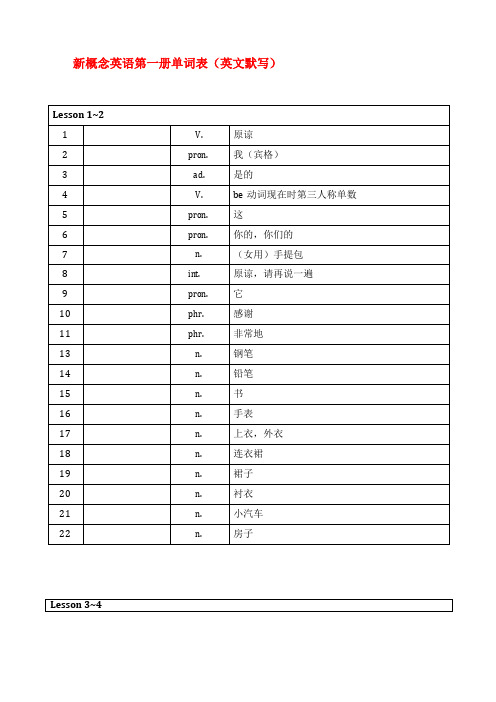
a.
准备好的,完好的
4
n.
正餐,晚餐
5
n.
饭馆,餐馆
6
a.
烤的
7
n.
早饭
8
n.
理发
9
n.
聚会
10
n.
假日
1
n.
杂乱,凌乱
2
v.
包装,打包,装箱
3
n.
手提箱
4
v.
离开
5
ad.
已经
Lesson85~86
1
n.
巴黎
2
n.
电影院
3
n.
电影
4
a.
漂亮的
5
n.
城市
在任何时候
Lesson87~88
5
n.
黄油
6
a.
纯净的
7
n.
蜂蜜
8
a.
成熟的
9
n.
香蕉
10
n.
果酱
11
a.
甜的
12
a.
橘黄色的;n.橙
13
phr.
苏格兰威士忌
14
a.
上等的,精选的
15
n.
苹果
16
n.
酒,果酒
17
n.
啤酒
18
n.
黑板
Lesson49~50
1
n.
卖肉的
2
n.
(食用)肉
3
n.
牛肉
4
n.
羔羊肉
5
n.
丈夫
6
n.
牛排
7
n.
肉馅,绞肉
手表
新概念英语第一册单词表(英译汉)
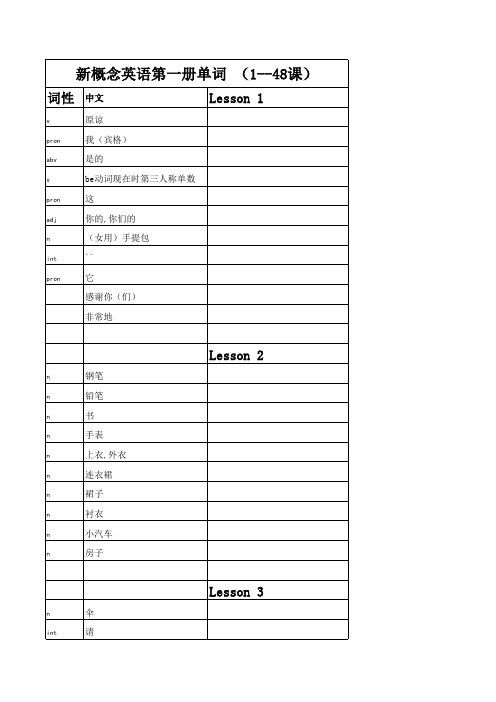
n
饼,蛋糕
n
饼干
v
喜欢,想要
v
想
adj
新鲜的
n
鸡蛋
n
黄油
adj
纯净的
n
蜂蜜
adj
成熟的
n
香蕉
n
果酱
adj
甜的
n
橙
n
苏格兰威士忌
adj
上等的,精选的
n
苹果
n
酒,果酒
n
啤酒
n
黑板
Lesson 47 Lesson 48
新概念英语第一册单词 (49--96课)
n
卖肉者
n
(食用)肉
n
牛肉
n
羔羊肉
n
丈夫
n
牛排
n
错误
n
礼物
n
词典
v
带
v
保留
v
改正,纠正
Lesson 106
Lesson 107
n
夫人,女士(对妇女的尊称)
adj
漂亮的
同样
v
适于
adj
漂亮的
Lesson 109
n
主意
少许(用于不可数名词之前)
n
一满茶匙
(little的比较级)较少的,
adj
更少的
几个(用于可数名词之前)
n
遗憾
adv
代替
n
建议,忠告
Lesson 53 Lesson 54
n
澳大利亚人
n
奥地利
n
奥地利人
n
加拿大
n
加拿大人
n
中国
n
芬兰
新概念英语第1册电子课本
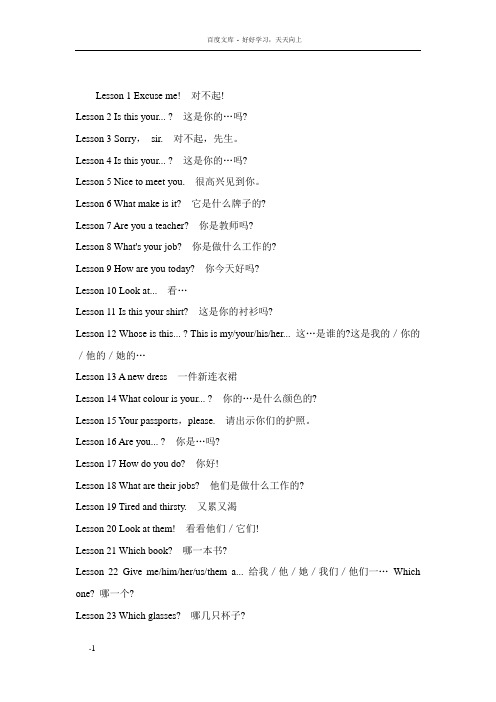
Lesson 1 Excuse me!对不起!Lesson 2 Is this your... ?这是你的…吗?Lesson 3 Sorry,sir.对不起,先生。
Lesson 4 Is this your... ?这是你的…吗?Lesson 5 Nice to meet you.很高兴见到你。
Lesson 6 What make is it?它是什么牌子的?Lesson 7 Are you a teacher?你是教师吗?Lesson 8 What's your job?你是做什么工作的?Lesson 9 How are you today?你今天好吗?Lesson 10 Look at...看…Lesson 11 Is this your shirt?这是你的衬衫吗?Lesson 12 Whose is this... ? This is my/your/his/her... 这…是谁的?这是我的/你的/他的/她的…Lesson 13 A new dress一件新连衣裙Lesson 14 What colour is your... ?你的…是什么颜色的?Lesson 15 Your passports,please.请出示你们的护照。
Lesson 16 Are you... ?你是…吗?Lesson 17 How do you do?你好!Lesson 18 What are their jobs?他们是做什么工作的?Lesson 19 Tired and thirsty.又累又渴Lesson 20 Look at them!看看他们/它们!Lesson 21 Which book?哪一本书?Lesson 22 Give me/him/her/us/them a... 给我/他/她/我们/他们一…Which one? 哪一个?Lesson 23 Which glasses?哪几只杯子?Lesson 24 Give me/him/her/us/them some... 给我/他/她/我们/他们一些…Which ones? 哪些?Lesson 25 Mrs. Smith's kitchen史密斯太太的厨房Lesson 26 Where is it?它在哪里?Lesson 27 Mrs. Smith's living room史密斯太太的客厅Lesson 28 Where are they?它们在哪里?Lesson 29 Come in,Amy.进来,艾米。
新概念英语第1册课文+译文

朗格教育高效英语学习中心新概念英语第1册英汉互译Lesson 1 Excuse me1excuse2我3是的 4 v.be动词现在时第三人称单数5your 6 (女用)手提包7pardon8它9感谢你(们)10 钢笔11 铅笔12 book13 watch 14 coat15 连衣裙16 skirt17衬衣18小汽车29 house1. 这是您的手提包吗?2.对不起! 什么事?3.是的,是我的4.这是您的手提包吗?5.这是您的手提包吗?6.非常感谢!7.对不起,请再说一遍?Lesson 3 Sorry, sir.1伞 2 please3这里 4 my 5 票 6 number 7 五8 对不起的9 sir 10 衣帽存放处11一套衣服12 school13 老师14 son 15 女儿1.这是我(寄存东西)的牌子。
2.是5号。
3.这是您的伞和大衣4.这不是我的伞5.对不起,先生。
6.这把伞是您的吗?7.不,不是!8.请把我的大衣和伞拿给我。
9.这把是吗?10.是,是这把11.非常感谢。
12.谢谢,先生Lesson 5 Nice to meet you1 先生2 好3 morning4 Miss5 新的6 学生7 French 8 German9 美好的10 遇见11 日本人12 Korean 13 中国人14 ad.也15(产品的)牌号16 Swedish 17 English 18 American 19 Italian 20Volvo 21标致22Mercedes 23丰田24 Daewoo 25 迷你26 福特27 Fiat1.这位是索菲娅.杜邦小姐。
2.索菲娅,这位是汉斯。
他是德国人。
3.这位是直子。
她是日本人。
4.索菲娅是个新学生。
她是法国人。
5.这位是昌宇。
他是韩国人。
6.很高兴见到你。
7.这位是鲁明。
他是中国人。
8.早上好,布莱克先生9. 这位是晓惠。
她也是中国人。
Lesson 7 Are you a teacher?1 I2 动词现在时第一人称单数3 动词现在时复数4 name5 what6 nationality7 工作8 电脑键盘9 operator10 工程师11 policeman 12 女警察13 出租汽车司机14 空中小姐15 邮递员16 护士17 机械师18 理发师1朗格教育高效英语学习中心19 家庭妇女20 送牛奶的人1你是做什么工作的? 2.很高兴见到你。
新概念第一册21-22课

it, one, that 它们三词均作代词用,指代前文提到的名词。
it 所指是同名同物; I like the car,
but I have no enough money to buy it.
one
pron. 一个
one 所指是同名异物; I like cars, but I can’t afford to buy one.
哪些游客?
Which tourists?
哪些游客来自于北京?
Which tourists are from Beijing?
empty adj. 空的; v. 倒空,使…变空
The bottle is empty now.
Empty the trash, please.
full adj. 满的
I drink a full glass of coffee. He got full marks for this answer. be full of 装满;充满
Give me a flower.
双宾动词
give sth. to sb. Give a flower to me. give up 放弃 My father gives up smoking. give in 屈服 His mother gives in and buys him a new bike. give a talk 作一次演讲 He will give us a talk tomorrow.
give sb. sth.
他给了我一支钢笔。 He gives me a pen.
give sb. sth.
He gives a pen to me. give sth.to sb.
to 用来说明“给”这个动作
- 1、下载文档前请自行甄别文档内容的完整性,平台不提供额外的编辑、内容补充、找答案等附加服务。
- 2、"仅部分预览"的文档,不可在线预览部分如存在完整性等问题,可反馈申请退款(可完整预览的文档不适用该条件!)。
- 3、如文档侵犯您的权益,请联系客服反馈,我们会尽快为您处理(人工客服工作时间:9:00-18:30)。
it to me,please. • S │V(及物)│ o(多指人) │ O(多指物) • 1. She │ordered │herself │a new dress. 她给自己定了一套新衣裳。 • 2. She │cooked │her husband │a delicious meal. 她给丈夫煮了一顿美餐3.
英语五种基本句型列式
• 一: S V (主+谓) • 二: S V P (主+系+表) • 三: S V O (主+谓+宾) • 四: S V o O (主+谓+间宾+直
宾) 五: S V O C (主+谓+宾+宾补)
• 基本句型 一:S V (主+谓)
• 主语:i you boy apple ......可以是人称代词,也可以是东西
• 谓语:不及物动词(vi.),它没有宾语,形成主谓结构,如:
We come.
谓语动词都能表达完整的意思。这类动词叫做不及物动词,后面
可以跟副词、介词短语、状语从句等,但是不跟宾语。
• S │ V (不及物动词)
• 1. The sun │was shining.
太阳在照耀着。
• 2. The moon │rose.
lesson 21 、22
句子成分(Members of a Sentence)
现代汉语里一般的句子成分有六种,即主语、谓语、 宾语、定语、状语和补语。英语的基本成分有七种: 主语(subject)、谓语(predicate)、表语 (predicative)、宾语(object)、定语 (attribute)、状语(adverbial) 和补语 (complement)。 英语句子的基本结构可以归 纳成五种基本句型及其扩大、组合、省略或倒装。 掌握这五种基本句型,是掌握各种英语句子结构的 基础。
there be 练习
two boys and a girl. a girl and two boys. some milk and three bananas. three bananas and some milk.
some any练习
• 1.Ann has __ apples. • some • 2.Bill doesn't have __ plums. • any • 3.Would you like __ milk? • some • 4.Is there __ jam in the fridge? • any
• 此结构后跟名词,表示‘(存在)有某事物’
• 试比较:There is a boy there.(那儿有一个男孩。)/前一个there无实意,后一个 there为副词‘那里’。
• 基本句型 三: S V O (主+谓+宾)
• 此句型句子的共同特点是:谓语动词都具有实义,都是主语产生的动作,但 不能表达完整的意思,必须跟有一个宾语,即动作的承受者,才能使意思完 整。这类动词叫做及物动词。宾语位于及物动词之后,一般同主语构成一样, 不同的是构成宾语的代词必须是‘代词宾格’,如:me,him,them等
• 基本句型 二: S V P (主+系+表)
• 此句型的句子有一个共同的特点:句子谓语动词都不能表达一个完整的意
• 思,必须加上一个表明主语身份或状态的表语构成复合谓语才能表达完整的意思
• 。这类动词叫做连系动词。系动词分两类:be, look, keep, seem等属一类,表示情 况;get, grow, become, turn等属另一类,表示变化。be 本身没有什么意义,只起连
• 2. The dinner │smells │good.
午餐的气味很好。
• 3. He │fell │in love.
他堕入了情网。
• 4. Everything │looks │different.
一切看来都不同了。
• 5. He │is growing │tall and strong. 他长得又高又壮
• S │V(及物动词)│ O • 1. Who │knows │the answer? 谁知道答案? • 2. She │smiled │her thanks. 她微笑表示感谢。 • 3. He │has refused │to help them. 他拒绝帮他们。 • 4. He │enjoys │reading. 他喜欢看书。 • 5. They │ate │what was left over. 他们吃了剩饭。 • 6. He │said │"Good morning." 他说:"早上好!" • 7. I │want │to have a cup of tea. 我想喝杯茶。 • 8. He │admits │that he was mistaken. 他承认犯了错误。 •。
系主语和表语的作用。其它系动词仍保持其部分词义。感官动词多可用作联系动词:
look well/面色好,sound nice/听起来不错,feel good/感觉好,smell bad/难闻
• S │V(是系动词)│ P
• 1. This │is │an English-Chinese dictionary. 这是本英汉辞典。
• 基 此句型的句子的共同特点是:动词虽然是及物动词,但是只跟一个宾语还不 能表达完整的意思,必须加上一个补充成分来补足宾语,才能使意思完整。
• 宾语补足语:位于宾语之后对宾语作出说明的成分。宾语与其补足语有逻辑 上的主谓关系,它们一起构成复合宾语。
• 基本句型 四: S V o O (主+谓+间宾+直宾) • 有些及物动词可以有两个宾语,如:give给,pass递,bring带,show显示。
这两个宾语通常一个指人,为间接宾语;一个指物,为直接宾语。间接宾语 一般位于直接宾语之前。 一般的顺序为:动词 + 间接宾语 + 直接宾语。如: Give me a cup of tea,please. • 强调间接宾语顺序为:动词 + 直接宾语 +介词+ 间接宾语。如:
• 介词短语作定语: • The boy in the classroom needs a pen of yours./教室里的男孩需要你的一支钢笔。 • The boy in blue is Tom./穿兰色衣服的孩子是汤姆。 • There are two boys of 9,and three of 10./有两个9岁的,三个10岁的男孩。 • 名词作定语: • The boy needs a ball pen./男孩需要一支圆珠笔。 • It is a ball pen./这是一支圆珠笔。 • There is only one ball pen in the pencil box./这铅笔盒里只有一支圆珠笔。 • 副词作定语: • The boy there needs a pen./那儿的男孩需要一支钢笔。 • The best boy here is Tom./这里最棒的男孩是Tom。 • 不定式作定语: • The boy to write this letter needs a pen./写这封信的男孩需要一支钢笔。 • The boy to write this letter is Tom./将要写这封信的男孩是汤姆。 • There is nothing to do today./今天无事要做。 • 分词(短语)作定语: • The smiling boy needs a pen bought by his mother./那个微笑的男孩需要一支他妈妈买的钢笔。 • The pen bought by her is made in China./她买的笔是中国产的。 • There are five boys left./有五个留下的男孩。 • 定语从句: • The boy who is reading needs the pen which you bought yesterday./那个在阅读的男孩需要你昨
• 形容词作定语: • The little boy needs a blue pen.(little修饰名词boy;blue修饰名词pen.)/小男孩
需要一支兰色的钢笔。
• Tom is a handsome boy./Tom是个英俊的男孩。 • There is a good boy./有个乖男孩。 • 数词作定语相当于形容词: • Two boys need two pens./两个男孩需要两支钢笔。 • The two boys are students./这两个男孩是学生。 • There are two boys in the room./房间里有两个男孩。 • 代词或名词所有格作定语: • His boy needs Tom\'s pen./他的男孩需要Tom的钢笔。 • His name is Tom./他的名字是汤姆。 • There are two boys of Toms there./那儿有Tom家的两个男孩。
• 名词/代词宾格 + 名词 • The war made him a soldier./战争使他成为一名战士. • 名词/代词宾格 + 形容词 • New methods make the job easy./新方法使这项工作变得轻松. • 名词/代词宾格 + 介词短语 • I often find him at work./我经常发现他在工作. • 名词/代词宾格 + 动词不定式 • The teacher ask the students to close the windows./老师让学生们关上窗户. • 名词/代词宾格 + 分词 • I saw a cat running across the road./我看见一只猫跑过了马路. • S │V(及物)│ O(宾语) │ C(宾补) • 1. They │appointed │him │manager. 他们任命他当经理。 • 2. They │painted │the door │green. 他们把门漆成绿色 • 3. This │set │them │thinking. 这使得他们要细想一想。 • 4. They │found │the house │deserted. 他们发现那房子无人居住。
